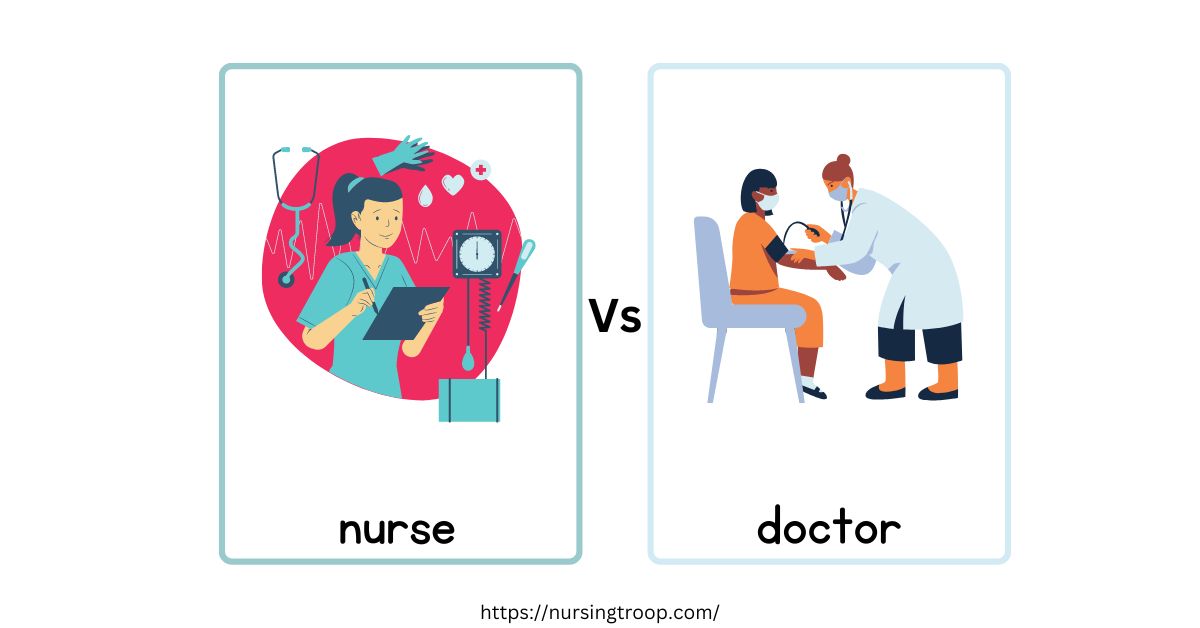If you have questions like the difference between a nurse and a doctor, you have come to the right place. Let us take an in-depth look at both professions to understand what separates them.
Table of Contents
What is the difference between Nurse and Doctor?
Nurse: Nurses provide care to patients on an ongoing basis. Though they may be called upon to diagnose specific ailments, their primary responsibility is providing compassionate care that can help speed recovery.
Doctor: Doctors are highly trained medical professionals with specialized degrees, such as MD or DO degrees. Doctors are also known as “physicians” and are responsible for diagnosing and treating medical conditions. They must have extensive knowledge of the human body and its diseases and illnesses.
In addition to these differences in job roles, there are some vast differences in the amount of training and education each profession requires.
What is the Educational difference between Nurse and Doctor?
The primary difference between a Nurse and a Doctor is the educational qualifications needed.
Nurse: A Nurse must have at least an Associate’s Degree in nursing. Nurses can further their education and specialize in a particular field, such as pediatrics or geriatrics. Nurses often specialize in pediatrics, geriatrics, or psychiatry and may hold an RN (registered nurse) or APRN (advanced practice registered nurse) degree.
Doctor: Doctor must complete 4 years of medical school, followed by 3-7 years of residency training in their specialty area.
What is the difference between the License of a Nurse and a Doctor?
To practice in the United States, a Nurse, and a Doctor must be licensed.
Nurse: The state board of nursing issues nurses a nursing license after passing their required licensing exams.
Doctor: On the other hand, doctors must pass the medical licensure exams administered by the National Board of Medical Examiners or from a state medical board.
Difference in Salary
Nurse: A nurse’s salary depends on the nurse’s type, level of education and experience, and location. As per the data from U.S Bureau of Labor Statistics 2019, registered nurses earned an average wage of $77,460 per year.
Doctor: The salary for doctors also varies depending on their specialty, years of experience, and location. In 2019, doctors earned an average salary of $300,000 per year, according to the U.S Bureau of Labor Statistics.
Differences in Shifts
Nurse: Nurses generally work 12-hour shifts, although they may work longer or shorter depending on the setting.
Doctor: Doctors usually work long hours and are often on call 24/7, though their shifts can vary depending on the size of their practice and specialty.
Differences In Title
Nurse: Nurses may hold titles such as registered nurse (RN), licensed practical nurse (LPN), or advanced practice registered nurses (APRN).
Doctor: Doctors are referred to by their specialties, such as family doctors, pediatricians, or surgeons. They can also hold the title of MD (Medical Doctor) or DO (Doctor of Osteopathy).
Difference in Personality
The personality differences between a Nurse and a Doctor are also significant.
Nurse: nurses are often better at providing emotional support and comfort to patients while in the hospital or clinic.
Doctor: Doctors tend to be more analytical, detail-oriented, and focused on the medical aspects of care than nurses.
Difference in Specialization
Nurse: Nurses may specialize in certain areas, such as critical care, pediatrics, geriatrics, or psychiatry.
Doctor: Doctors may also specialize in specific fields such as cardiology (heart disease), surgery, oncology (cancer), and more.
Final Thoughts
In conclusion, nurses and doctors are vital healthcare team members. They each provide essential contributions but also have significant differences that set them apart. It is crucial to understand these differences when considering a career path in healthcare.
Mrs. Marie Brown has been a registered nurse for over 25 years. She began her nursing career at a Level I Trauma Center in downtown Chicago, Illinois. There she worked in the Emergency Department and on the Surgical Intensive Care Unit. After several years, she moved to the Midwest and continued her nursing career in a critical care setting. For the last 10 years of her nursing career, Mrs. Brown worked as a flight nurse with an air ambulance service. During this time, she cared for patients throughout the United States.

